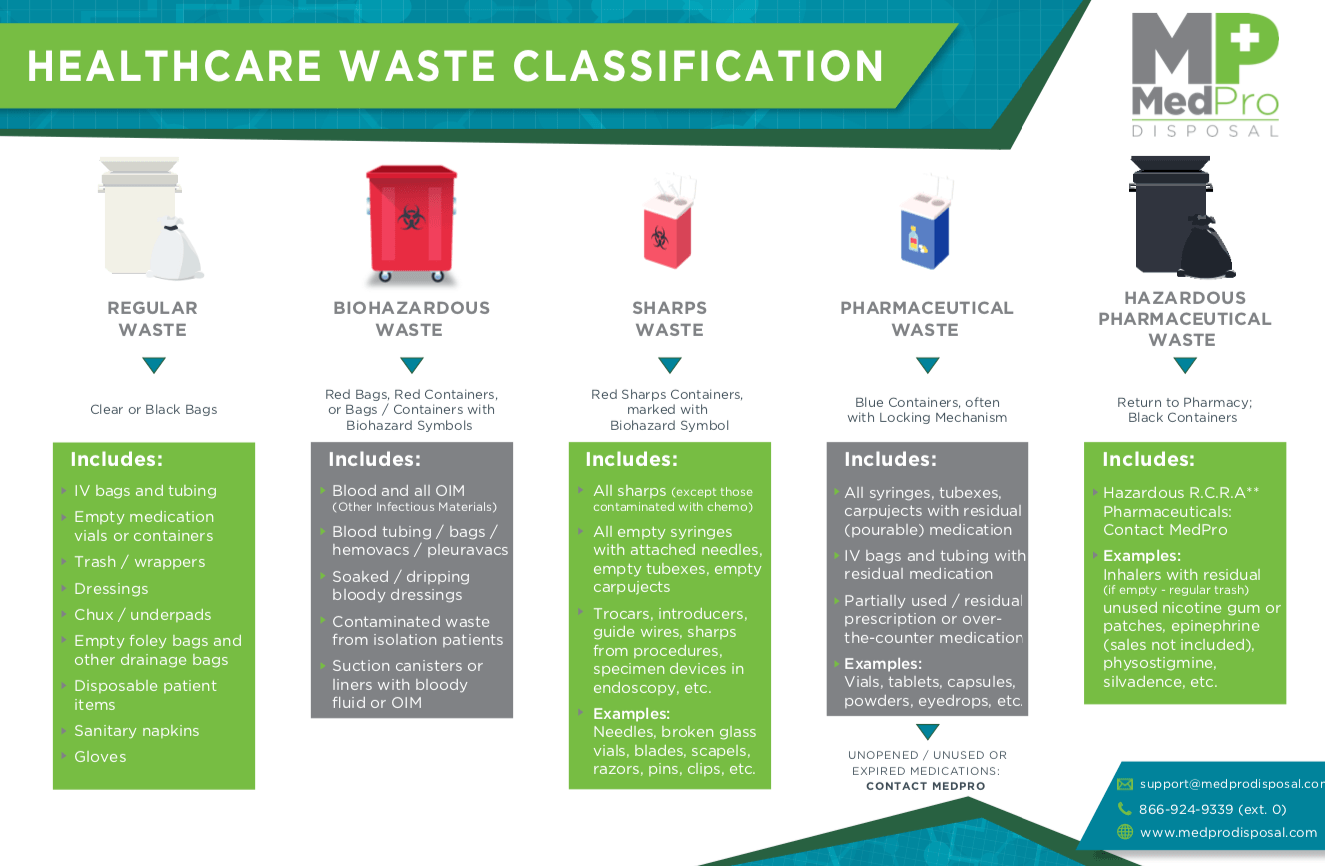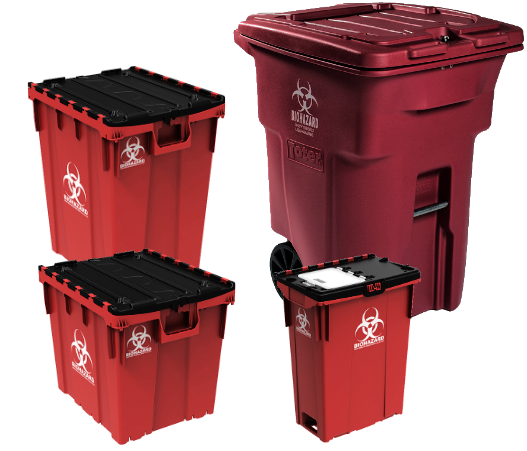Competence Let Loose: Grasping the Art of Medical Waste Removal for Health Facilities
Competence Let Loose: Grasping the Art of Medical Waste Removal for Health Facilities
Blog Article
The Relevance of Appropriate Garbage Disposal Practices
From the repercussions of inappropriate waste disposal on our environment to the long-lasting implications for future generations, the importance of embracing lasting waste administration practices can not be overemphasized. By discovering the ecological influence of reckless waste disposal, the benefits of reusing campaigns, and the relevance of neighborhood engagement in waste reduction efforts, a deeper understanding of why correct waste disposal methods are critical arises.
Ecological Effect of Improper Disposal
Inappropriate disposal of waste presents a substantial risk to the environment because of its harmful results on communities and human health. When waste is not properly managed, it can cause air pollution of the water, air, and soil, triggering injury to different plant and pet species. click here. Chemicals and toxic substances from incorrectly disposed waste can seep into the ground, polluting groundwater sources and affecting the health of both wild animals and humans
Additionally, the accumulation of waste in landfills generates greenhouse gases like methane, contributing to climate adjustment and international warming. Incorrect disposal methods also cause littering, which not just weakens the visual worth of the environment but can also harm wildlife via consumption or complexity.
To mitigate these ecological effects, it is important for people and areas to adopt proper waste disposal methods such as recycling, composting, and liable unsafe waste disposal. By taking these actions, we can aid safeguard ecological communities, protect natural deposits, and safeguard human wellness for existing and future generations.
Benefits of Recycling Programs
Frequently taking part in recycling programs uses numerous advantages for both the atmosphere and culture as a whole. This preservation of sources not just aids in maintaining ecological balance however also contributes to sustainable growth.
Moreover, reusing plays a vital duty in lowering energy usage and greenhouse gas emissions. The manufacturing of products from recycled products normally needs much less energy contrasted to making from virgin resources - medical waste disposal. Therefore, the carbon impact related to the production process is considerably reduced, assisting in the fight against environment adjustment
Additionally, reusing programs create task opportunities in the recycling industry, advertising financial development and social well-being. By motivating the recycling and reuse of materials, these programs support a round economic climate that reduces waste generation and makes best use of resource effectiveness, inevitably bring about a cleaner, greener future for generations to find.
Hazardous Waste Management Standards
Implementing efficient contaminated materials monitoring guidelines is essential for reducing environmental and wellness dangers linked with the improper disposal of harmful products - click here. Correct handling, treatment, and disposal of hazardous waste are necessary to avoid contamination of soil, water sources, and air
One key guideline is proper labeling of hazardous waste containers to ensure risk-free handling and transport. Furthermore, centers should abide by strict storage space requirements to stop leaks, spills, or crashes that could jeopardize human health and the setting. Routine training programs for employees on unsafe waste administration practices are additionally crucial to make sure conformity with regulations and promote a culture of safety and security.
Furthermore, harmful waste ought to be segregated based upon its properties to avoid chain reactions that could cause harmful scenarios. Carrying out an extensive waste tracking system can assist check the motion of harmful materials from generation to disposal, making certain openness and responsibility. By complying with these standards carefully, companies and sectors can add to a much safer and cleaner environment for present and future generations.
Area Involvement in Waste Decrease
To successfully deal with the ecological and health risks related to contaminated materials monitoring, engaging the neighborhood in waste decrease initiatives is extremely important. Community involvement plays a vital function in advertising lasting waste management techniques and fostering a society of environmental obligation. By educating residents concerning appropriate waste partition, reusing, and composting strategies, areas can considerably reduce the amount of waste sent out to landfills, consequently lessening ecological pollution and saving all-natural sources.
Community involvement in waste reduction programs additionally assists in increasing awareness about the importance of waste minimization and urges people to take on environmentally friendly behaviors in their daily lives - medical waste removal service. Joint efforts in between neighborhood authorities, waste administration business, and neighborhood participants can bring about the implementation of reliable waste reduction strategies tailored to the details requirements of each area or town
Furthermore, neighborhood engagement recommended you read cultivates a sense of ownership and responsibility amongst homeowners, equipping them to take aggressive actions towards decreasing waste generation and advertising a cleaner, healthier setting for future and current generations. By collaborating in the direction of common waste reduction goals, communities can make a considerable effect on minimizing the unfavorable results of inappropriate garbage disposal techniques.

Future of Sustainable Waste Practices
The development of lasting waste techniques is important for advancing ecological stewardship and resource preservation in the coming years. As the international population remains to grow, so does the amount of waste generated (medical waste removal). Conventional garbage disposal techniques, such as landfilling and incineration, are no much longer sustainable in the long-term due to their significant environmental effects. Progressing, the future of sustainable waste practices lies in embracing a round economic climate approach, where resources are recycled, reused, or repurposed to lessen waste generation.
Technological technologies play a crucial role in forming the future of lasting waste techniques. Advanced waste sorting and reusing modern technologies can aid improve the efficiency of waste administration processes, permitting the recuperation of beneficial sources from waste streams. Additionally, the adoption of naturally degradable products and composting methods can help in reducing the quantity of organic waste finishing up in land fills, consequently mitigating greenhouse gas exhausts.
In addition, advertising customer recognition and education on correct waste partition and disposal methods is important for driving behavioral modification in the direction of sustainability. By cultivating a culture of waste reduction, reuse, and recycling, areas can jointly add to a cleaner and much healthier atmosphere for future generations.

Conclusion
In final thought, proper waste disposal methods are essential for reducing ecological effect and promoting sustainability. By implementing reusing programs, managing contaminated materials correctly, and motivating neighborhood involvement in waste decrease efforts, we can function in the direction of a cleaner and healthier environment. It is necessary for businesses, people, and federal governments to focus on lasting waste techniques for the future health of our earth.

From the effects of incorrect waste disposal on our environment to the lasting ramifications for future generations, the importance of adopting sustainable waste monitoring techniques can not be overstated. By checking out the environmental impact of careless waste disposal, the advantages of recycling efforts, and the value of area involvement in waste decrease initiatives, a much deeper understanding of why proper waste disposal techniques are crucial emerges.
By enlightening residents concerning appropriate waste segregation, reusing, and composting strategies, neighborhoods can significantly minimize the quantity of waste sent out to land fills, thereby minimizing ecological air pollution and conserving natural resources. (click here)
Moving forward, the future of sustainable waste practices exists in welcoming a round economic situation approach, where resources are reused, reused, or repurposed to reduce waste generation.
Advanced waste sorting and reusing technologies can aid improve the efficiency of waste management procedures, enabling for the recovery of beneficial sources from waste streams.
Report this page